Shaping the culture in tunnelling projects: Safety Diagnostics Report
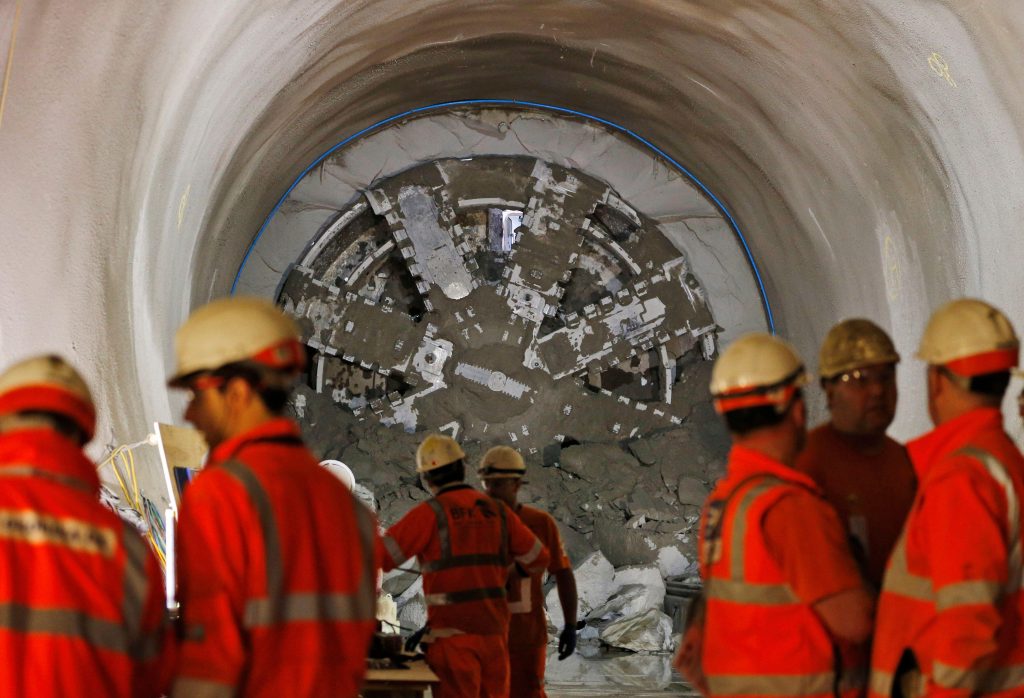
Associated Press
Culture is a cornerstone of project performance. Shaping a positive project culture can influence the values and behaviours of the construction team. Project culture will impact on every aspect of delivery: safety, quality, production.
Tunnelling projects can reflect a distinctive culture that presents both opportunities and challenges to project management. What are the distinctive characteristics of tunnelling projects and how do they compare to other big civils in the soft but critical areas of culture and climate? What are the unique factors that influence tunnelling culture?
Using data drawn from over 60,000 unique cases, this article sets out to compare tunnelling projects with other construction projects to determine those differences, evidenced by the values and behaviour of the people who work on them.
Key findings
Analysis of the Safety Diagnostics dataset, comparing around 28,000 cases from the tunnelling sector with 32,000 cases from UK civil engineering data indicates some key findings
- High esteem among tunnelling project teams
- Strong and respected leadership
- Tunnelling culture is mature and characterised by high levels of respect, trust and fairness
- Tunnelling teams are more likely to self-regulate positive behaviour among peers
But also
- Reluctance to speak up about safety issues
- Concerns about blame
- More likely to score highly for mental health factors including risk of stress and fatigue
Safety Diagnostics
Safety Diagnostics has been undertaking construction workforce research for more than twenty years. Anonymised data from our surveys is banked and used to provide a robust benchmark to provide context for survey results. Most of our data is drawn from major projects in the civil engineering sector and of these a good proportion of the projects involve tunnelling. This analysis, using data from the past seven years, compares the workforce responses from tunnelling projects to those from ‘other civils’. The results provide some surprising and illuminating contrasts, with implications for tunnelling project management and safety management.
About the survey population
All data was collected in the UK and Ireland over the last seven years. The data is anonymised before being banked to protect confidentiality. The data used includes c28,000 individual cases from tunnelling projects, compared with c32,000 cases from ‘other civils’.
It is possible that surveys will include the same individuals submitting survey responses from different projects or at different stages of the same project. The research objective of the surveys however is to describe project culture and it presumes that individual responses will be shaped by external pressures, both controlled: communication, leadership, training and uncontrolled: production imperatives, peer pressure.
The surveys are conducted as a census across whole populations with no sampling. The database therefore provides a crude but robust measure of culture in this sector.
There are some observable differences between the two populations which might impact on the outcomes. The two most obvious are that the tunnelling workforce tends to be younger than ‘other civils’, with 43% aged under 35 years compared to 39% in other civils.
The supervisory ratio tended to be slightly lower in tunnelling projects than in other civils, with 40% reporting supervisory responsibility compared to 44%.
Leadership: Tunnelling projects develop outstanding leaders
One striking contrast between tunnelling culture and other civils culture is the positive attitude towards leadership and immediate line management. Tunnellers rate leadership measurably higher than on other projects. Agreement is also stronger for questions about line managers and supervisors. There is one exception to this: tunnellers were less likely to report that they were comfortable approaching their line manager with a mental health problem
- Asked to rate Leadership as a workplace factor 48.6% of tunnelling population rated it ‘Really good’, compared to 39.3% of other civils workforce, a significant difference in response.
- Questions relating to ‘My boss’ or ‘My line manager’ attracted stronger agreement from tunnelling populations than other civils projects. Tunnelling respondents were more likely to agree that ‘My boss sets a good example in safety practice’ and ‘My boss listens to my concerns about safety’. They were significantly more likely to report that ‘I am valued and respected by my line manager’.
- In one leadership question, tunnelling respondents lagged behind other civils: ‘I could approach my line manager with a mental health problem’ and this is discussed below in mental health.
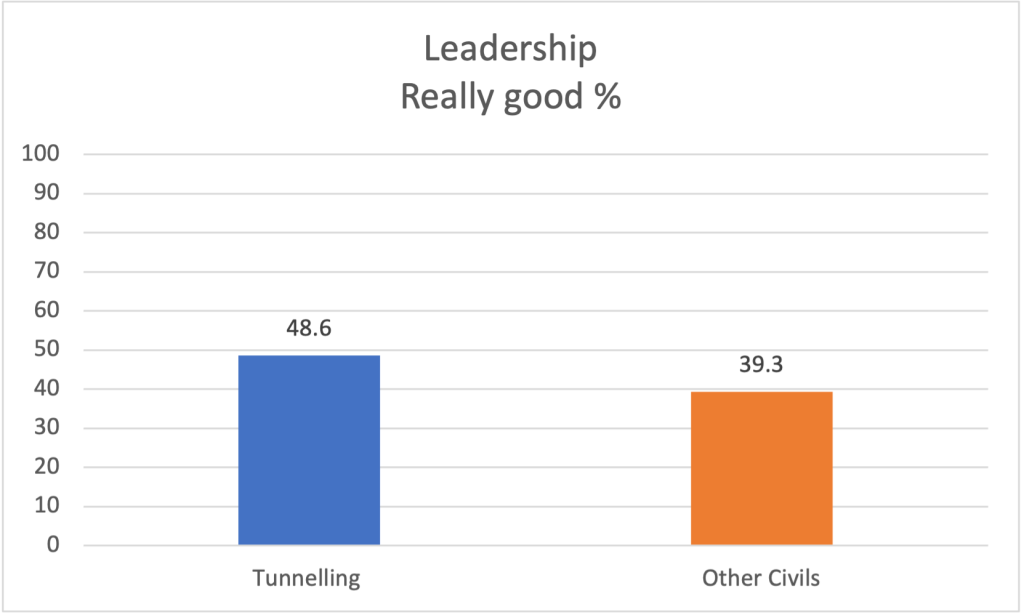
Esteem
A key indicator of a mature and successful project culture is the degree to which workers feel respected, trusted and valued. These ‘esteem’ factors are associated with positive empowered behaviour in the workplace.
Analysis of data suggests that tunnelling workforces score measurably and, in some cases, significantly higher for esteem factors when compared with other civils projects.
- In total 93% of tunnelling respondents agreed ‘’I am trusted to do my job safely” compared to 90% of other civil projects.
- A higher proportion of tunnelling respondents felt respected by their boss/line manager with 78% of tunnelling respondents agreed that ‘I am valued and respected by my boss’, compared to 73% on other civils projects.
- Confidence in the esteem of leaders extends to project management, with 65% of tunnellers agreeing “I am valued and respected by senior managers” compared to 56% in other civils projects.
- Esteem within the peer group is significantly higher for tunnellers than other civils workers, with 88% agreeing that they are “Valued and respected by workmates” compared to 77% of other civils.
- Fairness figures strongly in tunnelling culture. Tunnellers were significantly more likely to report their workplace always ‘Treating everyone with equal fairness’ by 56% to 40% for other civils projects.
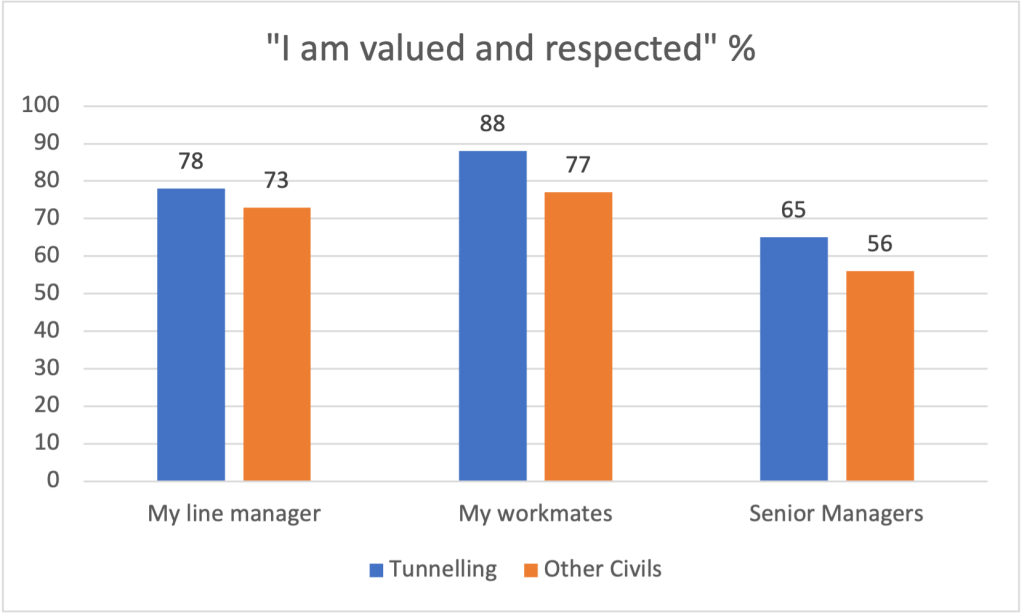
Communication
If culture is the beating heart of a project, communication is its circulatory system. All aspects of communication on tunnelling projects attract higher approval than on non-tunnelling projects. On tunnelling projects, workers are more likely to feel that communications are good overall. Engagement is also excellent with workers believing that they are listened to and that their ideas can make a difference.
- A much higher proportion of tunnellers rated overall Communications as ‘Really good’ (56%) when compared with other civils projects (36%.).
- A significantly higher proportion agreed that ‘Communication on the project is clear’ (65% to 60%)
- Much higher proportion of tunnelling teams rating ‘Listening to the workforce’(48%) as ‘Really Good’ when compared with other civils (31%).
- Tunnellers were more likely to agree ‘My ideas are listened to and acted on’. (72% in comparison with 67% for other civils),
- Tunnellers are also more likely to report that ‘my boss listens to my concerns about safety.’
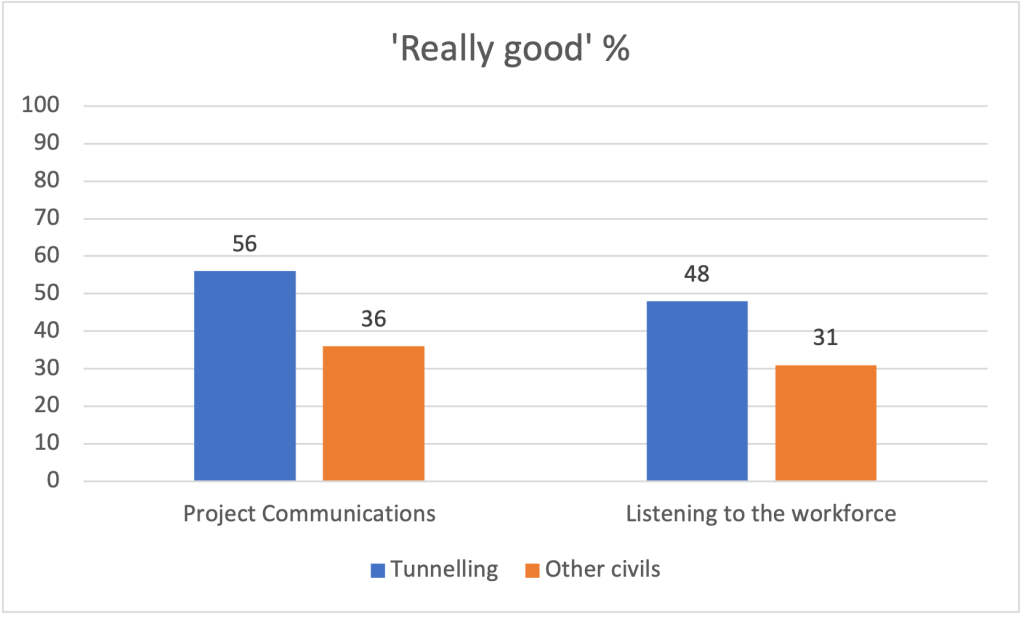
Blame Culture
Despite strong and powerful leadership, high esteem and effective communications, it appears that some tunnelling projects may still harbour a blame problem. Tunnelling workers are highly likely to report that they are empowered in the workplace (61%). They are also more likely than other civils to report that “My line manager will understand if I stop work for safety reasons.”
Nevertheless, tunnelling workers were also more likely to agree that ‘People are reluctant to speak up about safety”. They are also more likely to report that “When safety goes wrong, someone gets the blame.”
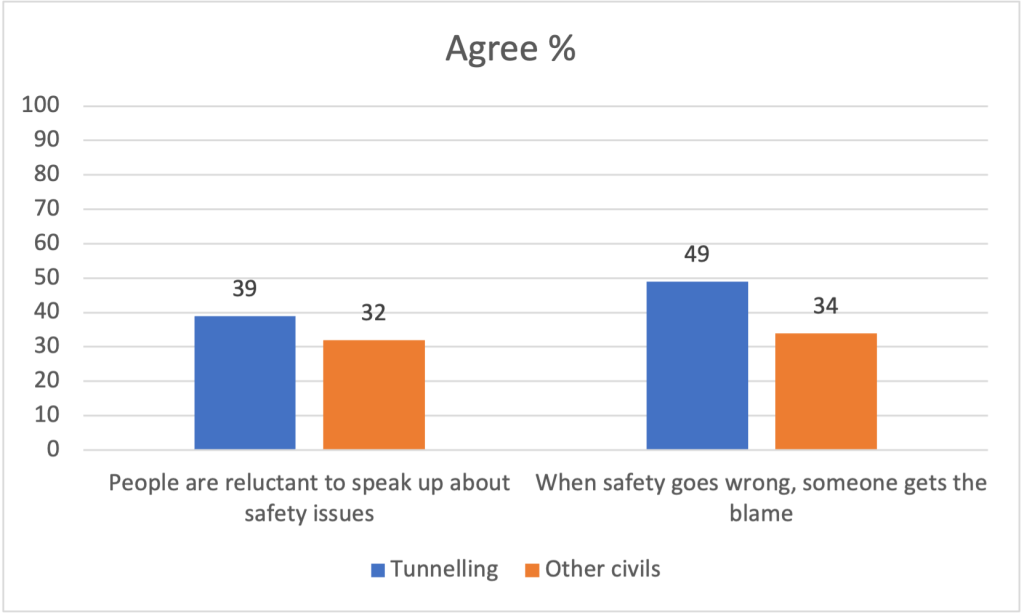
Taking action in unsafe situations
In responses to our surveys, tunnelling workers demonstrated that they are highly motivated to take action in unsafe situations.
They were more likely to stop working for safety reasons (46% to 43%) and they were far more likely to stop someone else working unsafely. (42% to 37%).
When questioned about specific situations in which they might challenge a colleague’s unsafe working, tunnellers are more likely to report ‘always’ than those in other areas of construction.
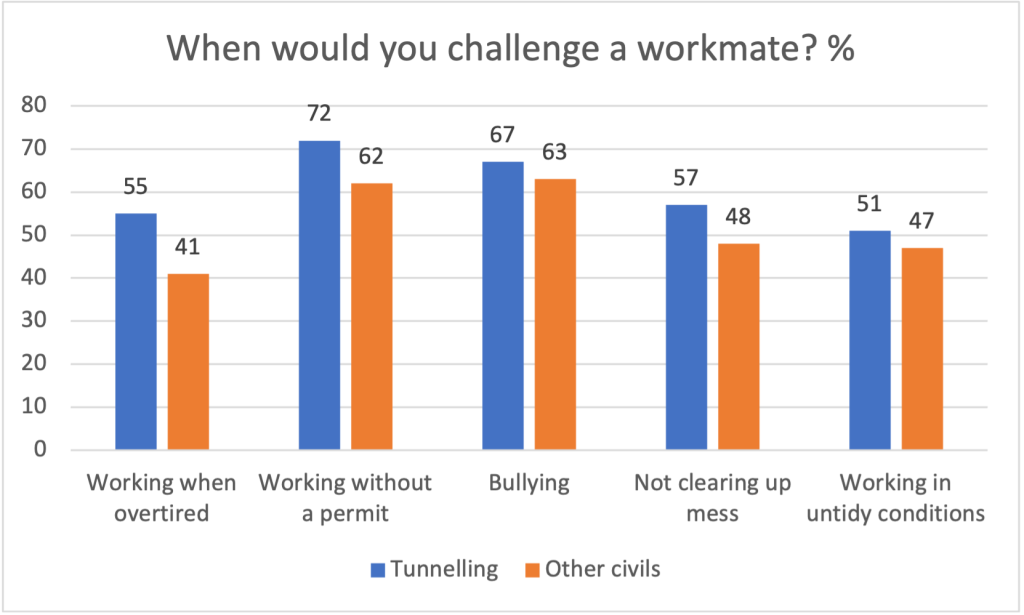
Mental Health
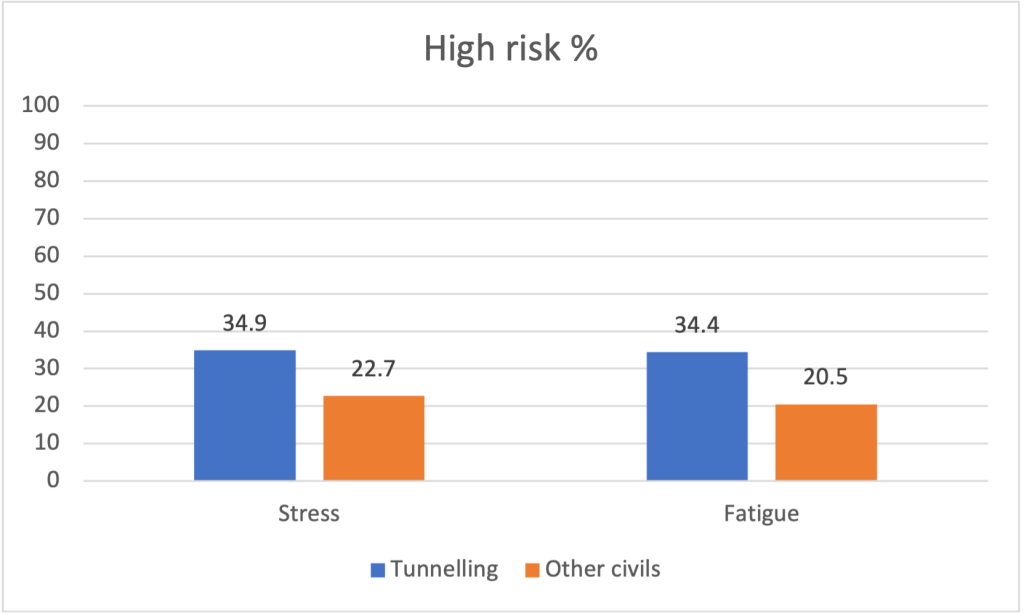
There was one particular area in which tunnelling workers diverged significantly from the rest of the measured construction population: mental health. Respondents from tunnelling projects were more likely to report being at high risk from stress and fatigue in comparison with those from ‘other civils’. There is a strong correlation in Safety Diagnostics data between high scores of risk from fatigue and other markers of mental health. It is possible that the prevalence of shift working in tunnelling projects, by comparison with other civils drives both the high fatigue and stress scores.
Satisfaction with management of mental health is relatively high for tunnelling projects. Tunnellers are more likely to approve of the projects understanding of mental health problems with 50% reporting this as ‘Very good’, compared to 40% of other civils.
However, tunnellers were significantly less likely to agree that ‘I could approach my boss with a mental health problem’ (71% to 81%).
This finding appears out of line with other data from the analysis. Workers and line managers in the tunnelling sector hold each other in mutual high esteem but tunnelling workers appear to be significantly more reluctant to approach line mangers with mental health problems.
What are the implications for tunnelling project managers?
- Creating a fair and equal workplace will allow tunnelling teams to thrive
- Tunnelling supervision is highly respected and teams will self-regulate positive behaviour
- When problems with mental health or fatigue arise, workers may be reluctant to raise these issues
- Managers need an objective external measurement to alert these risk factors
Tunnelling projects recruit from a pool of experienced and highly skilled workers. Projects may benefit from the legacy of previous schemes which have invested in all aspects of safety, particularly the behavioural areas. This has shaped an empowered workforce, high in esteem and ready to take independent action at the workface. Equally, tunnelling leaders, and particularly supervisors are highly respected by their teams and, according to Safety Diagnostics data, strong leadership correlates with positive attitudes and behaviours among the workforce. In most projects this is evidenced by the maturity of the safety culture as measured via climate surveys.
A prerequisite of this culture, however, is a fair and equal workplace. The values identified as strengths in the tunnelling cohort are unlikely to thrive in a command-and-control environment. Perception of blame is high within this workforce.
With the right environment, an open, positive and fair culture, tunnelling teams will work safely and productively and to an extent, self-managed negative behaviours within their peer group.
There are some specific risks that team managers need to be mindful of. Fatigue and stress are generally higher in tunnelling projects than other areas of construction. Unchecked, fatigue and stress can erode good practice and the values and behaviours that characterise the mature safety culture can unravel.
Analysis of Safety Diagnostics data identifies a reluctance to raise safety or mental health issues among tunnelling teams. This means that managers need to be watchful and employ objective measures to determine if stress and fatigue are impacting on team performance.








